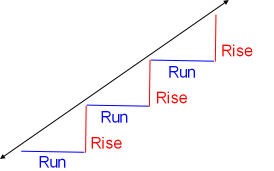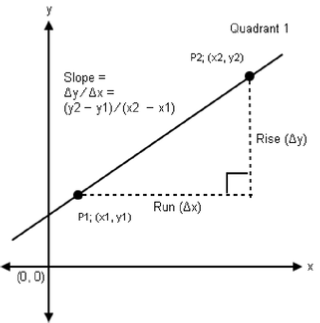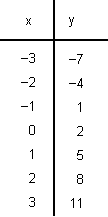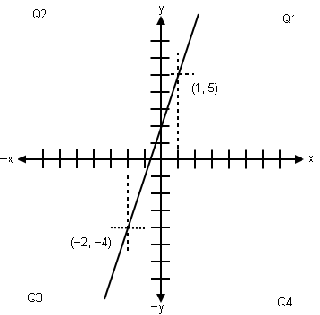 Sitemap
SitemapMobile Math Website
Graphing Linear Equations
To graph Linear Equations is a mapping process to diagram straight lines as objects. Mathematicians often diagram using Cartesian coordinate systems.
A Cartesian Coordinate System provides a central point of reference for an object and between objects. Cartesian coordinate systems are drawn by a horizontal x line bisecting a y line forming a 90 degree right angle. Coordinates x and y are on a single plane, a flat surface.
“To graph or solve Linear Equations use the Slope-Intercept Form:
y = mx + b
“Where m is the line slope, x is a coordinate value along the x axis and b is the y intercept.”
The slope of a straight line is a measure of steepness. Slope is described by a change in Rise, divided by a change in Run.

Slope = Rise / Run
Many run and rise together look like steps.
Rise is a distance Δy as y2 − y1, and Run is a distance Δx as x2 − x1 (Reference diagram below).

Graph of line showing linear slope as Δy / Δx.
How to Graph Linear Equations
By plugging values of “x” into a Linear Equation gives values of “y”.
Several coordinate solutions for
y = 3x + 2:

“Y” values for “x” integer values −3 thru 3.
Choose two x and y coordinate solutions. Use them as points through which to plot the line.

Graph of straight line equation y = 3x + 2 using coordinates (1, 5) and (−2, −4).
From the image directly above we already know that (1, 5) and (−2, −4) are two coordinate points of Linear Equation y = 3x + 2. But, what if we only knew the two coordinate points, not the equation? Yes, we can create the equation by applying the Slope-Intercept Form y = mx + b:
First determine the line slope…
m = (y2 − y1) / (x2 − x1) =
(5 − (−4)) / (1 − (−2)) = 9 / 3 = 3
and plug the slope, m , into the Slope-Intercept Equation y = mx + b.
y = 3x + b
Next determine b, the y intercept. To do this use any coordinate along the line and plug the x and y values into the Slope-Intercept Equation
(I’m going to use coordinate (1, 5) )…
5 = 3 (1) + b
5 − 3 = b
2 = b
And we can now write y = 3x + 2, the Linear Equation defined by line segment coordinate points (1, 5) and (−2, −4).
Copyright © DigitMath.com
All Rights Reserved.